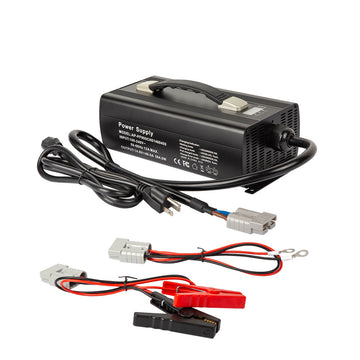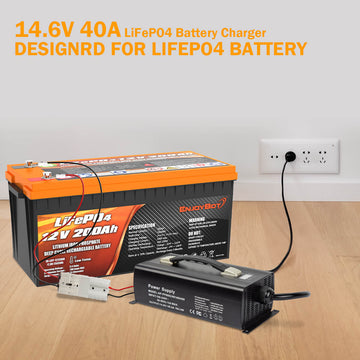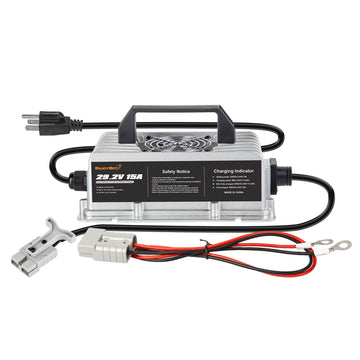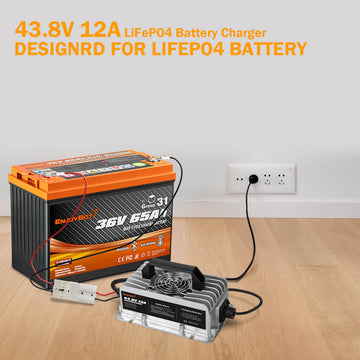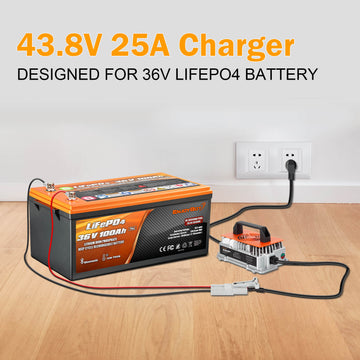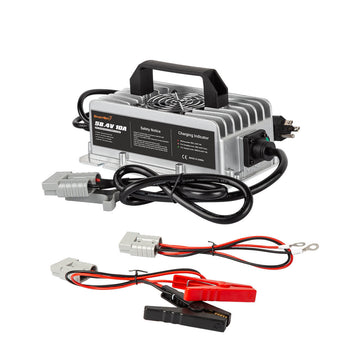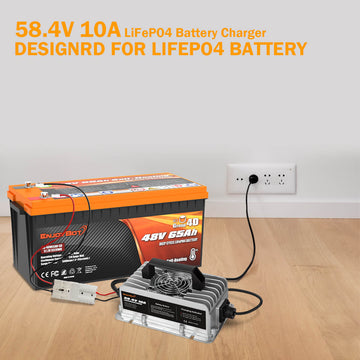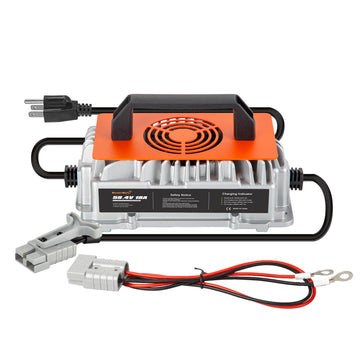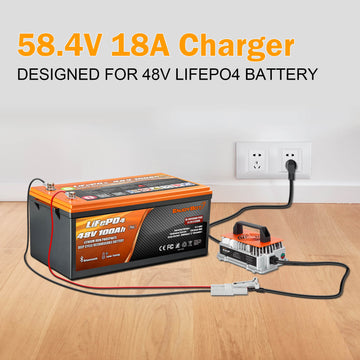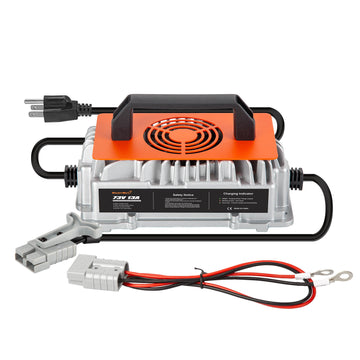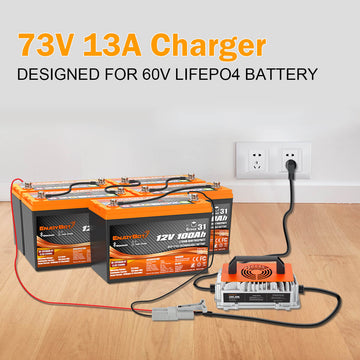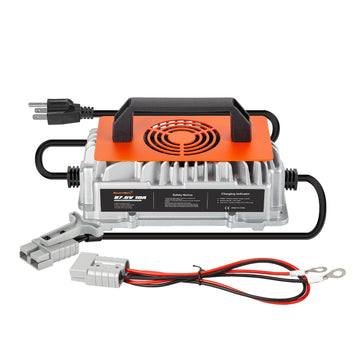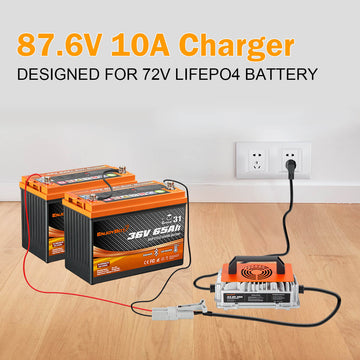Can Lithium Batteries Work in My Travel Trailer Motorhome?
Can lithium batteries work in my travel trailer motorhome?
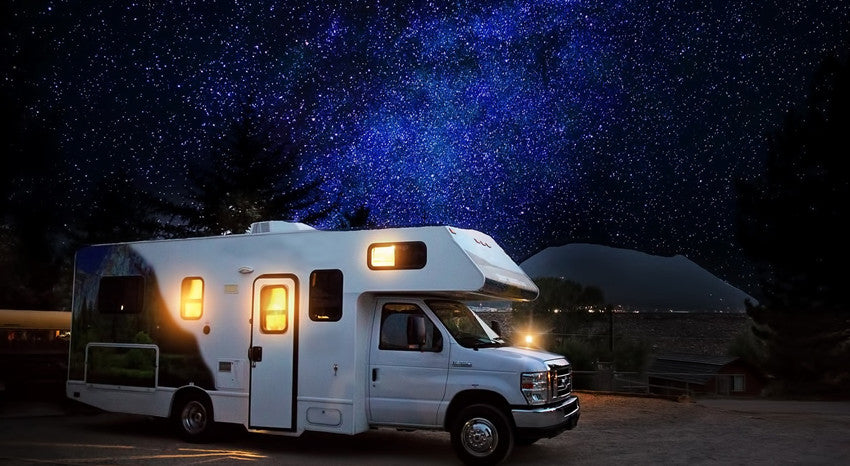
The travel trailer is one of the most accessible choices for getting into the RV lifestyle. Whether you are buying an RV for outdoor camping trips, long-term travel, or a permanent living solution, the travel trailer is one of the least expensive options. They are relatively lightweight, and you can also pull one with an SUV or truck that you probably already have.
The travel trailer has one glaring drawback which is the stock house batteries. They power everything on the RV’s interior and some exterior equipment. As electronics and appliances are becoming standard in RV camping, the stock batteries' power just isn't enough anymore.
That is why numerous RVers are upgrading their batteries to lithium iron phosphate (LiFePO4) batteries. The Enjoybot LiFePO4 batteries are the best option for your travel trailer RV.
Will Lithium Batteries Work in the Travel Trailer RV?
Lithium batteries work very well in travel trailers. You should be able to use a 12V lithium battery as a replacement for almost any deep-cycle 12V battery, such as the household battery for a motorhome, fifth wheel, or travel trailer. More and more RVers are switching their lead-acid house batteries to lithium-iron phosphate (LiFePO4) battery options.
You wouldn’t use a lithium battery as a cranking battery, though. A cranking battery, which gets your motor starting, sends a quick power burst to start the engine. Lithium batteries are designed to discharge over long periods and have a higher capacity, so lead-acid batteries are better for starting. Lithium-iron phosphate (LiFePO4) batteries would simply be underutilized and over-priced as starter batteries.
Long-term discharge components are part of what makes these power packs perfect for travel trailers.
What Batteries Come in a Travel Trailer RV?
Most travel trailer RVs typically come with 12V lead-acid batteries. They look a lot like cranking batteries you usually see under the hood of a car, but being deep-cycle batteries, they can withstand repeated cycles of charging and discharging.
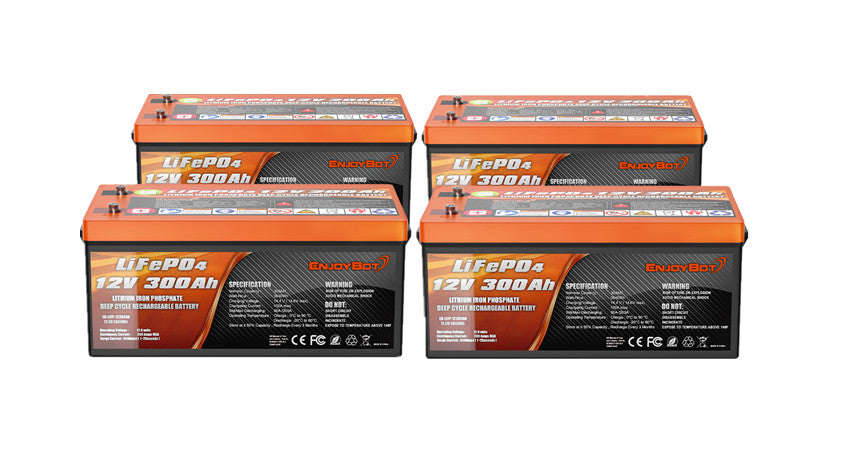
Travel Trailer Standard RV Battery Limitations
The household battery in a travel trailer RV powers 12V electric devices, such as interior lighting, water pumps, mini refrigerators, furnaces, overhead fans, etc. It might also power the exterior tail lights, marker lights, and electric brakes if a trailer is so equipped.
When you are camping in a state park or boondocking at a dispersed campsite, the house battery is vital. It is what keeps your lights on and refrigerated food free from contamination.
But standard deep-cycle lead-acid batteries don't last very long in terms of daily usage and lifespan. While the lead-acid battery's case may say it will last 80 amp-hours, you can only discharge it to 50% capacity (or 40 amp-hours) before you must recharge it.
If you discharge your lead-acid batteries below 50%, it will cause permanent damage, shortening their life span. Lead-acid batteries typically last two to three years, but it degrades faster if you frequently deplete them below the halfway point.
Benefits of Upgrading a Travel Trailer to Lithium Batteries
We have already mentioned that lithium batteries last longer than their lead-acid counterparts. This is just one of many benefits of upgrading a travel trailer RV from standard lead-acid batteries to lithium deep-cycle batteries. Let’s look at a few more.
Install Anywhere
Because the travel trailer RV is smaller than many RVs, smaller vehicles can tow travel trailer RV, and weight distribution becomes very important, such as the weight distribution of storage, holding tanks, gasoline tanks, added propane tanks, and other heavy things are critical to safe handling while towing.
The Lithium battery weighs about half of the lead-acid battery. This means that you have much more space for where you want to place those batteries. In reality, lithium batteries are light enough that they should not upset the overall weight distribution of the trailer.
Less Weight
Not only does this fifty percent weight reduction come in handy regarding weight distribution, but it can also be significant if you want to upgrade a single battery to a battery pack with multiple batteries.
A single lead-acid battery might weigh 70-80 pounds, while two Enjoybot lithium batteries are around 48-50 pounds. So even by upgrading to multiple lithium batteries, you are saving more weight over a single lead-acid battery.
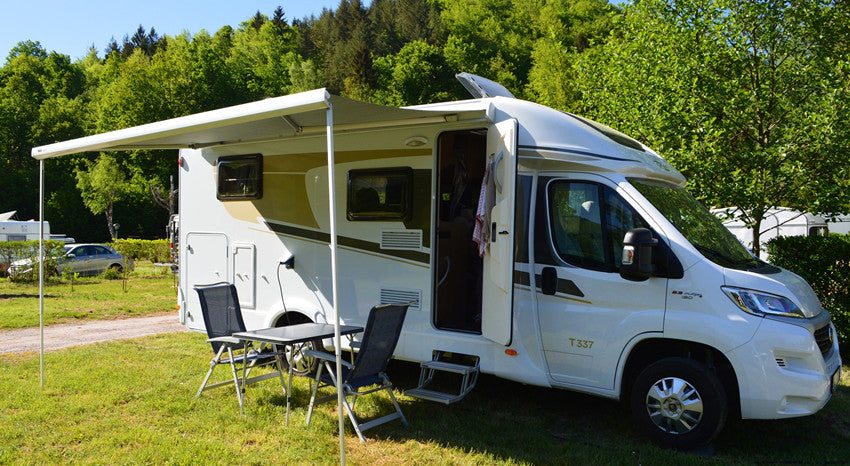
Lasts the Life of Your Trailer RV
Given that most RVers sell or upgrade their trailer RVs within 10 years of buying them, lithium batteries could last the lifetime of your trailer RV.
A well-maintained lead-acid battery that you never discharge below 50% capacity might last 300 to 500 charge/discharge cycles. Letting a lithium battery dip below the fifty percent threshold will not cause damage.
You can repeatedly discharge a lithium battery to twenty percent capacity, and it will still last 3000 to 5,000 cycles. That is about 10 times the lifespan of lead-acid counterparts!
No Maintenance
Lithium batteries are basically maintenance-free. They are coming with a battery management system that maintains optimum levels.
By comparison, you must monitor standard lead-acid batteries for their charging state and electrolyte levels. You might have to occasionally open it up to maintain water levels to keep the battery healthy. This might be dangerous if you don’t know how to do it properly, so many RVers have to schedule battery service regularly.
Even if you have a sealed lead-acid battery, you must monitor the charge and discharge state constantly to ensure it doesn’t dip below 50%.
More Efficient Power supply
Efficiency is where lithium batteries truly stand out. As we mentioned earlier, you can discharge lithium batteries below 20% without damaging them. That is a tremendous boost in available power per charging cycle!
So if you have both a lead-acid battery and a lithium-iron phosphate (LiFePO4) battery rated for 80 amp-hours, you will get more hours from the lithium battery in a smaller package. Not to mention you can efficiently run larger electrical loads, including 120V appliances with a suitable inverter.
Most Cost-Effective Batteries Over Time
It might get sticker shock when you are looking at the initial cost of lithium batteries next to lead-acid batteries. But if you consider the overall picture, lithium batteries win almost every time.
A lead-acid battery may only last a few years with heavy use, or possibly less if you discharge them below 50% more than once. By comparison, a lithium battery can last beyond 10 years thanks to its superior chemistry, battery management systems, and more durable construction.
So, while the cost of a quality lead-acid battery might be a third of lithium batteries, lithium batteries can last more than three times as long. If you do the math, you are saving money when you buy lithium batteries!

Safety
Lithium batteries are notoriously safe for RVs, despite what you may have heard.
Since the first few years of lithium technology, manufacturers have made incredible improvements, especially in the RV world. The most popular lithium technology for RV batteries is the lithium iron phosphate ( LiFePO4) battery. It uses a lower energy density and battery management system than other lithium-ion batteries to improve safety.
Additionally, the LiFePO4 battery is non-toxic, making them easier to dispose of than the lead-acid battery. Increased safety gives you peace of mind when camping with your family!
How to Upgrade a Travel Trailer RV to a Lithium Battery
If you are ready to upgrade from lead-acid batteries to lithium batteries, you can contact Enjoybot customer service or do it on your own if you are comfortable with do-it-yourself electrical projects.
Our Recommendation
We have many options in our inventory if you want to upgrade to lithium batteries, but this is the one we recommend for trailer RVs --Enjoybot 100AH 12V LiFePO4 Deep Cycle Battery.
The Enjoybot 100 amp/hour, 12V LiFePO4 deep-cycle battery is a drop-in replacement for similarly sized lead-acid batteries. It measures 12.95 x 6.77 x 8.42 inches, and model comes with a built-in battery management system, making it hassle-free. It also weighs just 23.8 pounds and comes with a 10-year warranty.
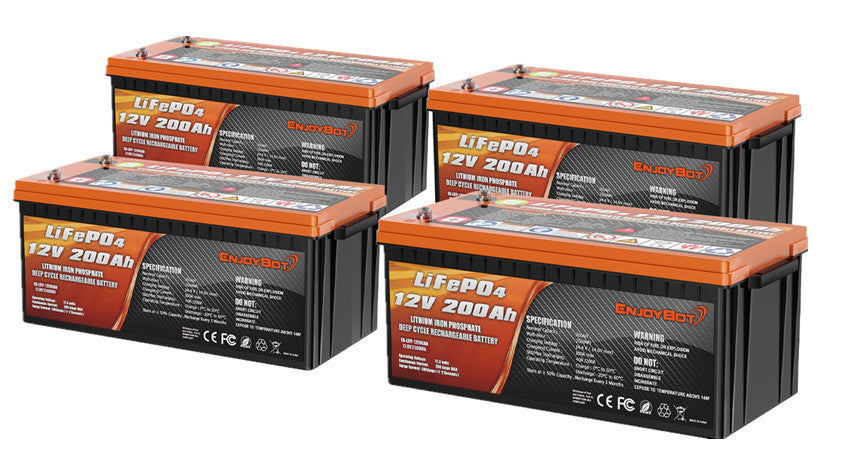
Conclusion
Are you ready to upgrade old lead-acid batteries to lithium batteries for your travel trailer RV? When you are considering whether or not to upgrade a trailer RV battery from a standard lead-acid battery to a lithium battery, there is very little reason not to. You can resolve many limitations of your current lead-acid battery with this simple upgrade!
Upgrading from lead-acid batteries to lithium batteries will provide for many more hours of uninterrupted enjoyment and additional years without worrying about how much longer your batteries might last. You can get out there and stay out there much longer with lithium batteries in your RV system.

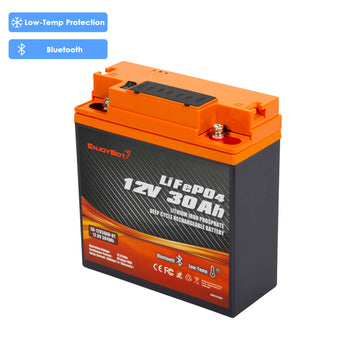
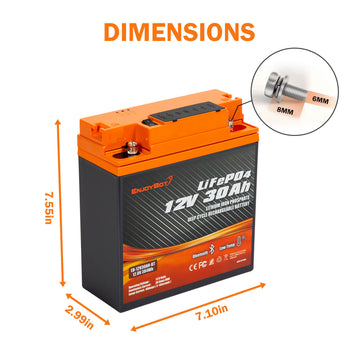











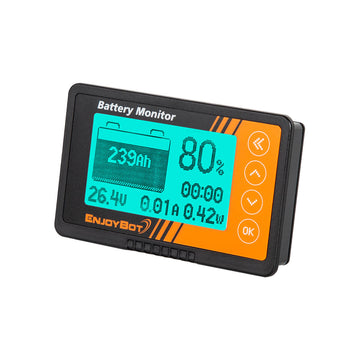
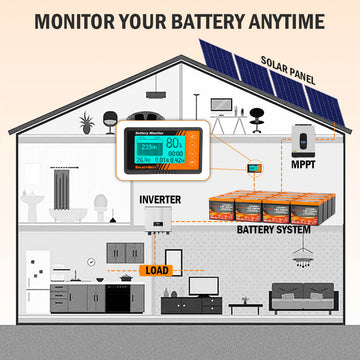
![[Upgraded Version] Enjoybot 14.6V 20A Waterproof Mountable LiFePO4 Lithium Battery Charger For 12V LiFePO4 Battery](http://enjoybotbattery.myshopify.com/cdn/shop/files/14.6V_20A_Waterproof_Battery_Charger_1_360x.jpg?v=1752565609)
![[Upgraded Version] Enjoybot 14.6V 20A Waterproof Mountable LiFePO4 Lithium Battery Charger For 12V LiFePO4 Battery](http://enjoybotbattery.myshopify.com/cdn/shop/files/14.6V_20A_Waterproof_Battery_Charger_2_360x.jpg?v=1752637374)
